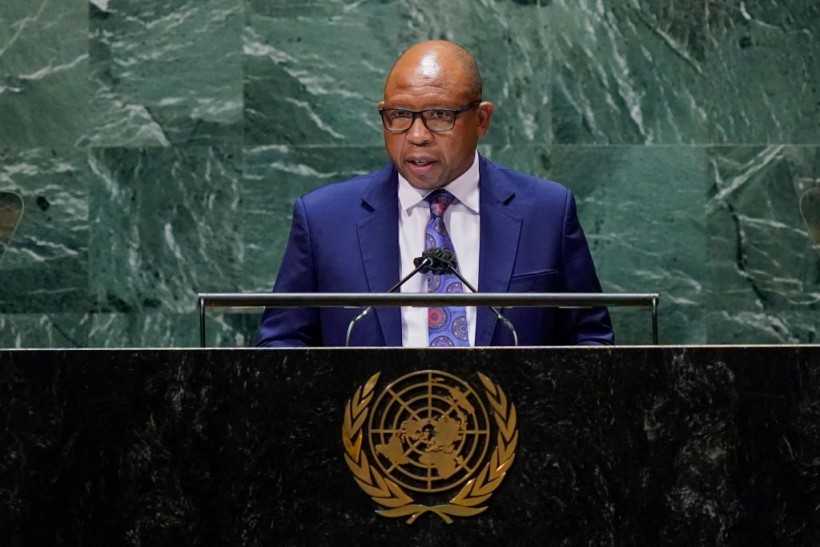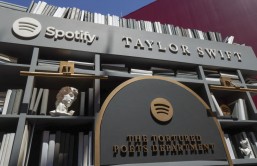
(Photo : Mary Altaffer-Pool/Getty Images)
Annual United Nations General Assembly Brings World Leaders Together In Person, And Virtually
NEW YORK, NEW YORK - SEPTEMBER 23: Lesotho's Prime Minister Moeketsi Majoro addresses the 76th Session of the U.N. General Assembly remotely at U.N. headquarters on September 23, 2021 in New York City. More than 100 heads of state or government are attending the session in person, although the size of delegations are smaller due to the Covid-19 pandemic. (Photo by Mary Altaffer-Pool/Getty Images)
Several African leaders spoke out about inequalities in COVID-19 vaccine accessibility at the United Nations General Assembly on Thursday, calling for greater international cooperation and access.
In a speech, South African President Cyril Ramaphosa claimed that vaccinations are "the best protection" against the pandemic's risks, and he criticized the world's wealthier and poorer countries' vaccine inequality.
Ramaphosa urged the United Nations to support a proposal that the World Health Organization's intellectual property rights for vaccinations be temporarily revoked so that low- and middle-income countries can produce more of the shots. During his speech, Angola's President, Joo Lourenço, described the vaccine access inequality as "shocking," Newsweek reported.
UN General Assembly highlights the need for COVID-19 vaccine equality
According to health experts, a world without COVID-19 will not be achievable unless everyone has equal access to vaccinations. More than 4.6 million people have died due to the virus since it began spreading throughout the world in early 2020, but the pace of deaths is anticipated to reduce if more people get vaccinated.
Developed countries are considerably more likely than poor nations to vaccinate their populations, thereby extending the pandemic and expanding global inequality, as per Big News Network. UN News highlights the importance of vaccination equality ahead of a meeting with senior UN officials on Monday at the UN.
Inequitable vaccine distribution not only exposes millions or billions of people to the fatal virus but also allows for the emergence and spread of even more lethal strains across the world.
Furthermore, unequal vaccine distribution will exacerbate inequality and widen the gap between rich and poor people, reversing decades of hard-won gains in human development.
Vaccine inequality will have a long-term impact on low- and lower-middle-income countries' socioeconomic recovery. It will impede progress toward the Sustainable Development Goals (SDGs), according to the UN. By 2030, eight out of ten individuals who were directly driven into poverty as a result of the pandemic will be living in the world's poorest countries.
Read Also: China's Xi Jinping Vows To Halt Building Coal-Burning Power Plants Abroad Ahead of Climate Talks
National leaders condemn excess COVID-19 vaccines of rich countries
According to estimates, COVID-19's economic effects in low-income nations might endure until 2024, while high-income countries could achieve pre-COVID-19 per capita GDP growth rates by the end of this year.
In his inaugural address to the United Nations General Assembly, US President Joe Biden called for a new era of international cooperation to combat the pandemic. Still, one year after world leaders pledged to bring COVID-19 vaccines and treatments to "all people, everywhere," the message of unity rang hollow.
Due to the current coronavirus catastrophe, Biden spoke to a considerably smaller gathering than usual on Tuesday, urging heads of state to take fast action to contain a pandemic that has killed millions and continues to resurge.
On Wednesday, the White House said that an extra 500 million doses of the COVID-19 vaccine will be sent to foreign countries in 2022. However, in the United Nations, the ongoing argument over how to effectively handle the huge disparity in vaccine availability is growing, with national leaders condemning vaccine excess in wealthy countries like the United States and the drip-feed of doses sent to the rest of the globe, CNN reported.
Unvaccinated Brazilian President Jair Bolsonaro opened the United Nations General Assembly on Tuesday by reiterating his defense of using "off-label" medications to treat COVID-19, claiming that he was among those who recovered after taking an anti-malaria drug that was found to be ineffective in treating the disease.
Related Article: Joe Biden Pledges To Double COVID-19 Vaccine Donation For Poor Nations; President Calls For More Global Shots









